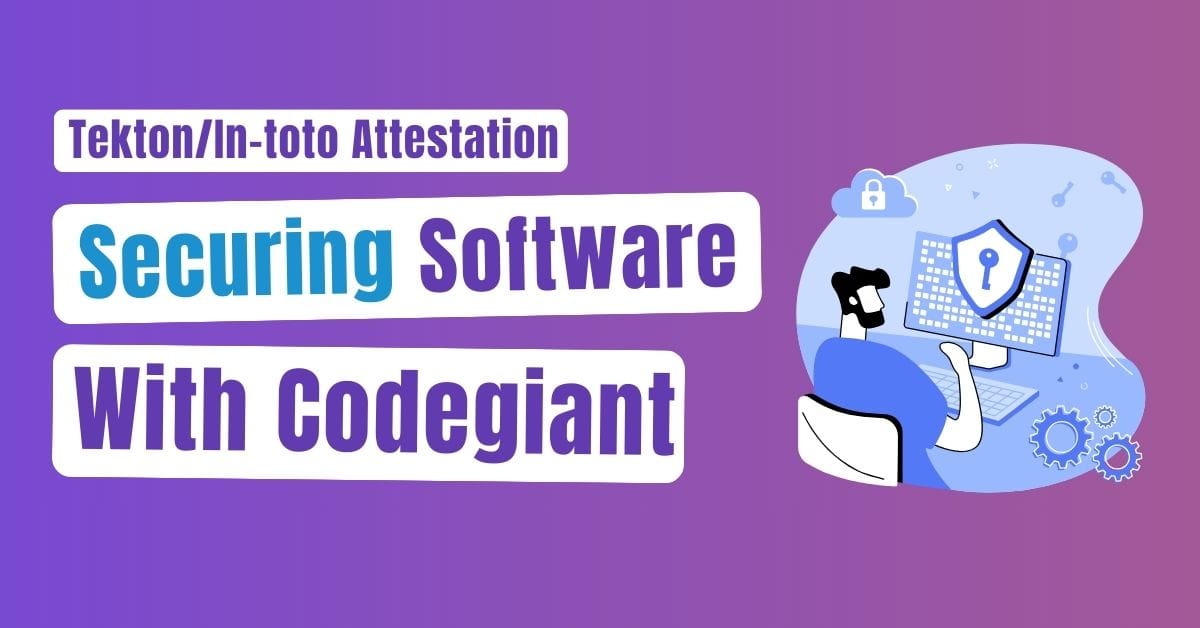Securing Software with Codegiant: Tekton and In-toto Attestation

For developers and companies, the right CI/CD tools can make a huge difference in delivering quality software quickly and securely. In this article, we'll learn how Codegiant integrates Tekton –– a leading open-source CI/CD framework –– with in-toto attestations. This integration enhances both security and trust in the software development process.
We'll look closely at how these technologies work together in Codegiant, making it a top choice for developers who need to keep their software development safe and efficient in the face of growing security challenges.
Let's start by exploring the specifics of these technologies and their significance in the CI/CD process.
Understanding Tekton
Tekton is an open-source framework designed for creating CI/CD systems, built to run on Kubernetes. It allows developers to define pipelines that automate the processes of building, testing, and deploying applications.
Key Components of Tekton in CI/CD:
- Tasks: The most fundamental units in Tekton, representing individual operations within a pipeline, like building a Docker image or running tests.
- Pipelines: A set of tasks arranged in a specific order of execution. They define the end-to-end flow from source code to deployment.
- PipelineRuns: Instances of pipelines that are executed with specific parameters and resources.
Example of a Simple Tekton Task:
apiVersion: tekton.dev/v1beta1
kind: Task
metadata:
name: hello-world
spec:
steps:
- name: echo
image: ubuntu
script: |
#!/bin/bash
echo "Hello, World!"This Task uses an Ubuntu image to run a simple script that prints "Hello, World!" It's a basic illustration of how a task is defined in Tekton.
In-toto Attestation for Supply Chain Security
In-toto is a framework that secures the software supply chain by ensuring the integrity of the software from development to deployment. It does this by generating metadata at each step of the software supply chain, which can later be verified to ensure that each step was carried out as intended, by the intended party, and wasn't tampered with.
Key Concepts:
- Layout: Specifies the steps in the software supply chain and the requirements for each step.
- Link Metadata: Generated by each step in the supply chain, recording the materials used and products produced, along with other relevant information.
Integration in Codegiant: Tekton Chains for Signed Provenance
Codegiant integrates Tekton along with Tekton Chains, enabling signed software supply chain provenance. Tekton Chains is instrumental in this process, capturing information about each step in a Tekton pipeline and signing it to create a verifiable record of the entire CI/CD process.
This approach is crucial for security, as it ensures every artifact produced in the pipeline can be traced back to its source with confirmed integrity, which is essential for preventing supply chain attacks involving malicious alterations. Additionally, for industries with stringent regulatory requirements, having a verifiable chain of custody for every aspect of the software build and deployment process is paramount for compliance.
Conclusion
The integration of Tekton for CI/CD and in-toto attestation in Codegiant provides a robust framework for secure software development and deployment. By ensuring the integrity of every step in the CI/CD pipeline and providing verifiable records of the software supply chain, Codegiant offers developers and organizations a secure, compliant, and efficient tool for modern software development needs.
If you enjoyed this article or have any questions, please don't hesitate to reach out in the comments. As always, we value your feedback!
